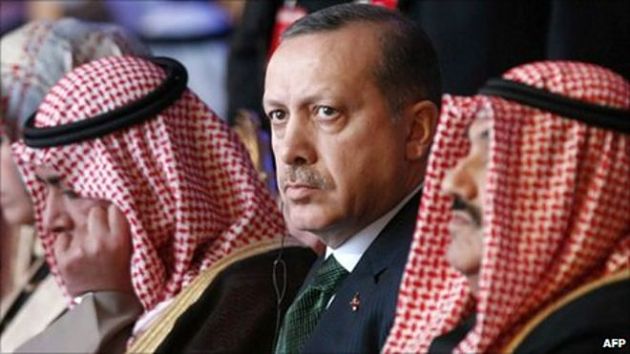French President Emmanuel Macron’s policy of confrontation with Turkey and its president raises questions about the motives of the Arab regimes that have sided with France, Israel and Greece in this conflict. Several media outlets have focused on this issue in recent days.
For example, a Middle East Eye article titled «A new message resounds in the Arab world: Get Ankara» discusses the consolidation of Arab regimes against Turkey and its policies in the region. The article summarizes recent news from the Arab world, including remarks made by United Arab Emirates (UAE) Foreign Minister Anwar Gargash at an Arab League meeting, where he described Turkey’s intervention in the internal affairs of Arab countries as a clear example of negative interference in the region. It also mentions Egyptian Foreign Minister Sameh Shoukry’s statement that Turkey’s intervention in the affairs of many Arab countries is the main challenge to Arab national security and that Egypt will not remain silent about it. In addition, The Jordan Times, the main official voice of Jordan, published an article that also acknowledges Turkey’s interference in Arab countries such as Libya, Syria and Iraq and calls for recognizing and responding to this fact.
The author of the Middle East Eye article, David Hearst, argues that behind the anti-Turkish rhetoric of Arab regimes is their fear of Recep Tayyip Erdogan becoming the leader of the Sunni Muslim world. He believes that Turkey, rather than Iran, has become the main enemy of Israel, the Arab regimes and France due to its growing ambitions to play a more active role in the Middle East and Africa, which clashes with Ankara’s policies.
The motive behind the Arab regimes’ hostility toward Turkey can be attributed to nationalism, both at the state and pan-Arab levels. The first motive relates to the preservation of their countries’ independence, as sympathy for Erdogan and his politics of political Islam can be seen as a threat to their states. The second motive, pan-Arab nationalism, traditionally opposes non-Arab and non-Muslim interference in Arab affairs, whether from Iran or Turkey.
But what happens to this state nationalism when states like the UAE and Saudi Arabia pursue internal policies that alter the traditional fabric of their societies under external influence? Where does Arab pride go when countries like the UAE and Bahrain abandon the interests of Arab Palestine in favor of Israel, which is recognized by international law and the international community? Or where does their Arab pride and jealousy go when they start supporting military interventions in Arab countries by non-Arab and non-Muslim countries such as Russia, France or the United States?
On the other hand, Turkey faces difficulties in countering this nationalism in its foreign policy towards the Arab world. While its rhetoric addresses the Muslim Ummah and Muslims worldwide, Turkey itself is a nation-state and conducts its policies based on national interests. This is both a strength and a weakness of its policy. On the one hand, it allows Turkish society to understand military activities and economic costs abroad in terms of national interests. On the other hand, it gives ammunition to those who perceive Turkish policy as Turkish imperialism towards other countries, including Arab countries.
With its patchwork policy, it will be problematic for Turkey to counter the growing anti-Turkish sentiment in the Arab world. It will either lead to an increase of anti-Turkish sentiments in the Arab world, which will lead to Turkey’s isolation, or Turkey will have to return to a policy of reviving the «Arab Spring» with the aim of overthrowing all anti-Turkish regimes from within and bringing Turkey’s allies to power.
It remains uncertain, however, whether the Turks have the desire and resources to pursue such a burdensome policy for the nation-state. Alternatively, they may accept the growing alienation of the Arab world from Turkey as an inevitable reality.

